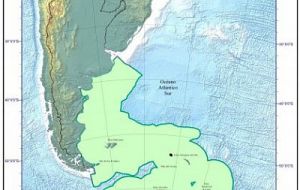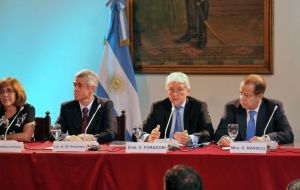MercoPress. South Atlantic News Agency
Delimitation of the Argentine continental shelf
 Comparison of the Argentine submission with the area approved by CLCS
Comparison of the Argentine submission with the area approved by CLCS By Professor Peter Willetts, South Atlantic Council (*) - The Argentine Foreign Ministry announced on 28 March 2016 that it had gained international recognition of a claim to an exceptionally large continental shelf. But they were mistaken. Argentina had made a submission to the Commission on the Limits of the Continental Shelf (CLCS) on 21 April 2009 to claim sovereignty rights over the resources of the sea-bed.
The claim covered all the shelf that spreads hundreds of miles to the east and south of Argentina. This included the disputed territories of the Falkland Islands and South Georgia and the South Sandwich Islands that all sit on the continental shelf, far from the Argentine mainland. The claim also covered a section of the Antarctic continental shelf, an area where no government can exercise sovereignty. On 23 May 2016, the Commission made public its recommendations and only a small proportion of the Argentine claim was endorsed. This paper explains the legal regime and the political process that led the Commission to refuse to endorse the Argentine claim to the shelf around the islands controlled by the United Kingdom and to a part of Antarctica.
The continental shelf can be understood as the continuation of the coastal land mass into relatively shallow seas, before the deep oceans are reached. It usually spreads out as a gently sloping area, until it drops sharply at the continental slope. The boundary of the shelf is defined in terms of the foot of the slope or the line where the depth reaches 2,500 metres or where the sediments from the coast thin out. It requires a great deal of scientific investigation to established which of the criteria apply and where the boundary lies. The matter is simplified to some extent, by allowing all coastal states a minimum legal shelf of 200 NM (even if the geology does not justify it). There are also two alternative maximum limits.
The international law on the continental shelf is embedded in a major global treaty, the United Nations Convention on the Law of the Sea (UNCLOS). It defines the role and the status of the Commission. UNCLOS also declares the Commission’s recommendations are “final and binding”. The Commission is composed of 21 scientists and each submission is examined by a sub-commission of seven Commission members. The Convention and the CLCS Rules of Procedure forbid these scientists from making any decisions about legal or political disputes. For this reason, the Commission instructed the sub-commission on the Argentine submission not to consider the shelf around the disputed islands.
In 1957-59, Argentina and Britain were among the twelve governments that set up scientific programmes in Antarctica for an International Geophyical Year. This led to the 1959 Antarctic Treaty, which suspended all claims to sovereignty in Antarctica. With the addition of other legal arrangement, this grew into the Antarctic Treaty System (ATS), which created a global science observatory and wildlife reserve. In November 2004, Australia became the first country to claim a continental shelf in Antarctica. Governments divided into two groups on the question of how to ensure compatibility between UNCLOS and the ATS. However, they were united in arguing the Commission should not consider any claims. One group wanted restrictions “for the time being” and the other wanted permanent restrictions on any sovereignty rights. The sub-commission on the Australian submission was instructed in April 2005 not to consider a boundary for the Australian claim to part of Antarctica. Following such a precedent, the Commission had no choice but to refuse to consider the Argentine claim to a different part of Antarctica.
In April 2010, there were two other cases directly relevant to the Argentine submission. The Commission refused to establish a sub-commission to consider the British partial submission on the Falklands and on South Georgia and the South Sandwich Islands, due to the dispute with Argentina. The Commission also responded to a Norwegian submission on Bouvet Island and Queen Maud Land (part of the main Antarctic land mass). It did establish a sub-commission, but instructed it only to consider Bouvet Island.
In this context, it is not surprising that the Commission decided, in August 2009, in relation to the Argentine submission, that it could consider neither the disputed islands nor Antarctica. When the Argentine submission came to the head of the queue in August 2012 and a sub-commission was established, these decisions were reaffirmed.
The recommendations on Argentina were finalised by the sub-commission in August 2015; confirmed by the full Commission on 11 March 2016; and sent to the Argentine government just over two weeks later. The Foreign Ministry published a map on 28 March suggesting the whole Argentine submission had been endorsed. The Argentine and British press produced incorrect headlines about the UN approving Argentine claims to sovereignty over the Falklands. Nothing remotely justified these headlines. The maps released on 23 May 2016, in the Commission’s Summary of the Recommendations show two sectors had been endorsed. The first runs from the Rio de la Plata boundary with Uruguay south to the boundary of the waters around the Falklands. The other is a tiny area south of Tierra del Fuego and Staten Island. All data about the shelf around the disputed islands and adjacent to Antarctic was completely ignored and no boundaries for these areas were endorsed.
It remains a mystery how professional staff in the Argentine Foreign Ministry could fail to appreciate what was happening in the Commission. It was clear for over six and a half years, from August 2009 to March 2016 that the Commission would not and could not approve the whole submission. An even more important question for the Argentine political system is to ask how the Foreign Minister, Susana Malcorra, and her Deputy, Carlos Foradori, were so misled by the diplomats.
The South Atlantic Council was formed to promote communication between Argentines, British people and Falkland Islanders, in order to seek co-operation and understanding that might eventually lead to a peaceful settlement, to the Falklands/Malvinas dispute, acceptable to all three parties. Neither Britain nor Argentina can separately gain any internationally recognised rights to exploit the resources of the continental shelf, in the south-west Atlantic, so long as the dispute continues. On the other hand, the Commission could endorse a joint submission, if the governments of Argentina and the UK were willing to agree pragmatic arrangements to share the resources. This story demonstrates how pointless it is to continue with ritualised conflict, based on a nineteenth century idea of sovereignty.
(*) Peter Willetts is Emeritus Professor of Global Politics, City University London
The article is a short summary of the South Atlantic Council Occasional Paper Number 14, May 2016.
For the full paper as a web page, see:
http://www.staff.city.ac.uk/p.willetts/SAC/OP/OCCPAP14.HTM
or download a PDF copy from:
http://www.staff.city.ac.uk/p.willetts/SAC/OP/OCCPAP14.PDF
The views expressed in South Atlantic Council Occasional Papers are those of the author and are not necessarily shared by all members of the Council. The paper may be freely copied and printed, in whole or in part, for any non-commercial purposes, provided that any quotations are made without any amendments and that both the author and the SAC are cited.






Top Comments
Disclaimer & comment rules-

-

-

Read all comments''The international law on the continental shelf is embedded in a major global treaty, the United Nations Convention on the Law of the Sea (UNCLOS). It defines the role and the status of the Commission. UNCLOS also declares the Commission’s recommendations are “final and binding”. The Commission is composed of 21 scientists and each submission is examined by a sub-commission of seven Commission members. The Convention and the CLCS Rules of Procedure forbid these scientists from making any decisions about legal or political disputes. For this reason, the Commission instructed the sub-commission on the Argentine submission not to consider the shelf around the disputed islands.'' Correct.
Jun 03rd, 2016 - 07:57 pm 0What the UN actually said,
''With regard to the recommendations in respect of the submission made by Argentina, it is recalled that, previously, the Commission had already decided that it was not in a position to consider and qualify those parts of the submission that were subject to dispute and those parts that were related to the continental shelf appurtenant to Antarctica ''(see CLCS/64, paras. 76 and 77 and CLCS/76 para. 57) And Paragraph 3 of UN Press Release from Ban Ki-Moon's office dated 28th March 2016:
http://www.un.org/press/en/2016/sea2030.doc.htm
http://www.un.org/press/en/2016/sea2030.doc.htm
At this rate Argentina will be claiming all the bloody bacteria next,
Jun 03rd, 2016 - 08:09 pm 0along with all the bacteria's that support them.
“The sub-commission on the Australian submission was instructed in April 2005 not to consider a boundary for the Australian claim to part of Antarctica.”
Jun 04th, 2016 - 12:51 am 0Page 49 from Australia's submission in NOVEMBER 2004
http://www.un.org/depts/los/clcs_new/submissions_files/aus04/Documents/aus_doc_es_web_delivery.pdf
“Australia requests the Commission in accordance with its rules not to take any action for the time being with regard to the information in this Submission that relates to continental shelf appurtenant to Antarctica”
Seems Australia set the precedent.
Sorry Argentina.
Commenting for this story is now closed.
If you have a Facebook account, become a fan and comment on our Facebook Page!